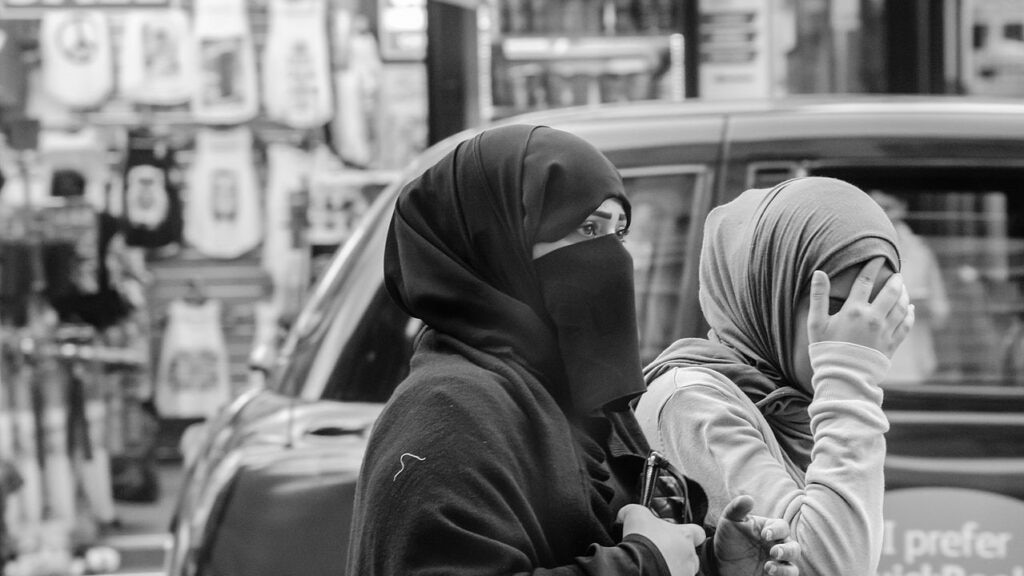Guidance regarding basic Islamic issues – which Hazrat Amirul Momineen, Khalifatul Masih Vaa has given on various occasions in his written correspondence and during MTA programmes – is being officially published below for everyone’s benefit
Burial rites during the Covid-19 pandemic
A gentleman from Qadian, India, wrote to Hazrat Amirul Momineen, Khalifatul Masih Vaa that, “Before her demise, my mother had told me that, whenever she passed away, I should perform her ghusl [i.e. washing of the dead body]. However, since my mother died of Covid-19, the ghusl could not be performed. This has caused me great pain. Please, could you guide me as to whether I acted appropriately.”
Huzoor-e-Anwaraa, in his letter dated 19 September 2021, provided the following guidance in this regard:
“As a matter of fact, under normal circumstances, only a woman should wash a woman’s dead body and only a man should wash a man’s, except in the case of a husband and wife who are permitted to wash each other’s dead body. Thus, it was a very good thing that you did not wash your mother’s body.
“Anyway, as you wrote, she died due to Covid-19. So, even for medical reasons, you would not have been allowed to perform her ghusl. Thus, you need not worry about it at all. May Allah the Exalted have mercy on your mother. May He forgive her, raise her status, grant comely patience to all her family members and make them the inheritors of the legacy of her good deeds and prayers. Amin.”

A woman’s testimony
Someone from Germany wrote to Hazrat Amirul Momineen, Khalifatul Masih Vaa and requested guidance regarding women’s testimony in light of a verse of Surah al-Baqarah that discusses the presence of witnesses in cases dealing with debts or loans.
Huzoor-e-Anwaraa, in his letter dated 21 September 2021, gave the following reply to this question:
“One of the major objections raised by the opponents of Islam to Islamic teachings is that Islam had attached half the value to the testimony of a woman as compared to that of a man and had, thus, declared women as inferior. However, this objection, like other objections, has been concocted for no valid reason and due to not understanding the truth and spirit of Islamic teachings.
“The fact of the matter is that the Holy Quran has not stated anywhere that a woman’s testimony was worth half that of a man. Rather, if we ponder over the Holy Quran, we see that in such matters that are directly related to women, the testimony of a woman has been accepted in the same way as that of a man. Hence, in case of li‘an, the method of testimony that has been stipulated in Surah an-Nur, there is no difference between the testimony or the oath of the woman or the man, rather exactly the same conclusion has been drawn from both. Thus, Allah the Exalted states:
وَ الَّذِيۡنَ يَرۡمُوۡنَ اَزۡوَاجَهُمۡ وَ لَمۡ يَكُنۡ لَّهُمۡ شُهَدَآءُ اِلَّاۤ اَنۡفُسُهُمۡ فَشَهَادَةُ اَحَدِهِمۡ اَرۡبَعُ شَهٰدٰتٍۭ بِاللّٰهِ ۙ اِنَّهٗ لَمِنَ الصّٰدِقِيۡنَ۔ وَ الۡخَامِسَةُ اَنَّ لَعۡنَتَ اللّٰهِ عَلَيۡهِ اِنۡ كَانَ مِنَ الۡكٰذِبِيۡنَ۔ وَ يَدۡرَؤُا عَنۡهَا الۡعَذَابَ اَنۡ تَشۡهَدَ اَرۡبَعَ شَهٰدٰتٍۭ بِاللّٰهِ ۙ اِنَّهٗ لَمِنَ الۡكٰذِبِيۡنَ ۙ۔ وَ الۡخَامِسَةَ اَنَّ غَضَبَ اللّٰهِ عَلَيۡهَاۤ اِنۡ كَانَ مِنَ الصّٰدِقِيۡنَ۔
“‘And as for those who calumniate their wives, and have not witnesses except themselves — the evidence of any one of such people (shall suffice) if he bears witness four times in the name of Allah (saying) that he is surely of those who speak the truth. And (his) fifth (oath shall be to say) that Allah’s curse be upon him if he be of the liars. But it shall avert the punishment from her if she bears witness four times in the name of Allah (saying) that he is of the liars. And (her) fifth (oath shall be to say) that the wrath of Allah be upon her if he speaks the truth.’ (Surah an-Nur, Ch.24: V.7-10)
“Moreover, it is also proven from Hadith that the Holy Prophetsa separated a married couple on account of the testimony of a single woman who said that she had nursed both the bridegroom and the bride during their childhood. Hence, Hazrat ’Uqbara bin al-Harith relates that he had married the daughter of Abu Ihab bin Aziz. Later on, a woman came forward and said, ‘I have nursed ’Uqba and the woman whom he has married. (Hence, they are foster-siblings and their marriage is invalid.)’ ’Uqba said to her, ‘Neither did I know that you had nursed me, nor did you previously inform me about it.’ Then ’Uqba mounted his ride and went to see Allah’s Messengersa at Medina; he asked him about (the issue at hand). Allah’s Messengersa said, ‘How can you keep her as your wife when it has been said [that she is your foster-sister]?’ Thus, ’Uqba let go of her and she married another man. (Sahih al-Bukhari, Kitab al-‘ilm, Bab ar-rihlati fi l-mas’alati n-nazilati wa ta‘limi ’ahlih)
“As far as the testimony of men and women in cases dealing with debts or loans is concerned, since such cases are generally related to men and not directly to women, we have been instructed that, if the men appointed to testify in such cases are not available, two women should be appointed along with a man, so that if the woman who is testifying forgets the details of her testimony, the other woman may remind her.
“In other words, even in this scenario, the actual testimony is only that of one woman. The second woman is only appointed as a precautionary measure to remind the first one lest she forget because such issues are not directly related to her. The text of the Holy Quran also supports this understanding, as it states:
يَا أَيُّهَا الَّذِينَ آَمَنُوا إِذَا تَدَايَنْتُمْ بِدَيْنٍ إِلَى أَجَلٍ مُسَمًّى ۔۔۔ وَاسْتَشْهِدُوا شَهِيدَيْنِ مِنْ رِجَالِكُمْ فَإِنْ لَمْ يَكُونَا رَجُلَيْنِ فَرَجُلٌ وَامْرَأَتَانِ مِمَّنْ تَرْضَوْنَ مِنَ الشُّهَدَاءِ أَنْ تَضِلَّ إِحْدَاهُمَا فَتُذَكِّرَ إِحْدَاهُمَا الْأُخْرَى
“‘O ye who believe! when you borrow one from another for a fixed period… And call two witnesses from among your men; and if two men be not (available), then a man and two women, of such as you like as witnesses, so that if either of two (women) should err (in memory), then one may remind the other.’ (Surah al-Baqarah, Ch. 2, V. 283)
“Thus, whether it is a woman or a man, the status and importance of the testimony of both is equal even in cases related to loan transactions. However, since financial deals are usually not related to women, we have been instructed to appoint another woman with the testifying woman to help her by reminding her of the matter in case she forgets the details of the case. This is so that neither of the two parties in the case may be wronged because of her forgetting.”

Navigating through a world full of interest (riba) and doubt
Someone from Syria presented his research regarding the existence of some elements of interest [riba] in stock trading etc. to Hazrat Amirul Momineen, Khalifatul Masih Vaa.
Huzoor-e-Anwaraa, in his letter dated 28 September 2021, commented on it as follows:
“Conducting academic research is a very good idea. You may by all means do research on this and share your findings with me. As far as the presence of elements of interest in various types of businesses in the present era is concerned, the following statement of the Promised Messiahas, the Hakam ‘Adl of this age, is fundamental to understanding this phenomenon. Huzooras states:
“‘In recent times, most jurisprudential issues in this country have become convoluted. There is one or the other element of interest [riba] involved in every trade. This is why renewed ijtihad is needed in this age.’ (Al-Badr, nos. 41-42, vol. 3, 1-8 November 1904, p. 8)
“While defining interest on another occasion, the Promised Messiahas stated:
“‘The sharia defines interest as lending money to someone for a prearranged profit in return. Whenever this definition is applicable, it is considered interest. However, if the borrower does not pledge any [such payment] but voluntarily pays back extra, then that amount would not be considered interest. Therefore, when it comes to the fulfilment of pledges, prophets have always acted favourably towards others. If a king borrows some money and voluntarily returns more [than the principal amount] and he, as the borrower, does not pay it with the intention that it is interest fee, then it is not considered interest, rather a favour from the king. Whenever God’s Messengersa took a loan from someone, at the time of repayment he would always return some extra. One should only be mindful not to be desirous of it. However, if one received an additional sum contrary to one’s desire or expectation, then that would not be considered interest.’ (Al-Badr, no. 10, vol. 2, 27 March 1903, p. 75)
“Thus, the interest that Islam has forbidden results from a person lending money to someone with the intention of getting back a premium on top of the principal amount given as a loan. However, if the borrower returns something extra voluntarily, it is not considered interest.
“Moreover, the banking system has become an integral part of almost every wordly business nowadays. And most of the world’s banking systems have some element of interest in them, which then becomes part of those businesses as well. That is why Huzooras stated that there was some element of interest involved in every trade, due to which renewed ijtihad was required in this age.
“Under such circumstances, if a person remains given to a lot of doubt and suspicion, then his life would become unbearable, because some interest money would have been invested somewhere in the companies that do business with the clothes that we wear in our daily lives. Then, the bread we eat, there will be some involvement of interest money at some stage or another in its business. And if a person wants to abandon all these worldly needs in favour of merely sitting in his house, which is obviously impossible, even then, his house would have been made of bricks, sand and cement and the companies that make these materials also would have dealt with interest or used interest money in their businesses.
“Hence, one should not create unnecessary difficulties for oneself by subjecting such matters to extreme scrutiny and falling into suspicion. It is also mentioned in a hadith as narrated by Hazrat Aishara that:
أَنَّ قَوْمًا قَالُوا يَا رَسُولَ اللّٰهِ إِنَّ قَوْمًا يَأْتُونَنَا بِاللَّحْمِ لَا نَدْرِي أَذَكَرُوا اسْمَ اللّٰهِ عَلَيْهِ أَمْ لَا فَقَالَ رَسُولُ اللّٰهِ صَلَّى اللّٰهُ عَلَيْهِ وَسَلَّمَ سَمُّوا اللّٰهَ عَلَيْهِ وَكُلُوهُ
“‘A group of people said to Allah’s Messengersa, ‘Some people bring us meat and we do not know whether they mention Allah’s name or not (while slaughtering the animal).’ He said, ‘Mention Allah’s name (i.e. recite the basmalah) on (the meat) and eat it.’’ (Sahih al-Bukhari, Kitab al-Buyu‘)
“The Promised Messiahas was asked whether it was permissible to eat food prepared by Hindus. He stated:
“‘The sharia has made it permissible. The sharia does not insist on such restrictions; rather, it pays emphasis on:
قَدۡ اَفۡلَحَ مَنۡ زَكّٰهَا
“‘[He indeed (truly) prospers who purifies it. (Surah al-Shams, Ch.91: V.10)]. The Holy Prophetsa would eat items prepared by Armenians and, in any case, one cannot do without it.’ (Al Hakam, no. 19, vol. 8, 10 June 1904, p. 3)
[…]
“Thus, one should act with piety when tending to the various matters and worldly affairs, without giving way to suspicion and doubts. And where there is a direct possibility of committing a prohibited act or the prohibition of something is clearly evident, then it should be avoided at all costs. In this regard, there is another hadith of the Holy Prophetsa that guides us in the best possible manner. Hazrat Aishara states:
مَا خُيِّرَ النَّبِيُّ صَلَّى اللّٰهُ عَلَيْهِ وَسَلَّمَ بَيْنَ أَمْرَيْنِ إِلَّا اخْتَارَ أَيْسَرَهُمَا مَا لَمْ يَأْثَمْ فَإِذَا كَانَ الْإِثْمُ كَانَ أَبْعَدَهُمَا مِنْهُ وَاللّٰهِ مَا انْتَقَمَ لِنَفْسِهِ فِي شَيْءٍ يُؤْتَى إِلَيْهِ قَطُّ حَتَّى تُنْتَهَكَ حُرُمَاتُ اللّٰهِ فَيَنْتَقِمُ لِلّٰهِ
“‘Whenever the Holy Prophetsa was given an option between two things, he used to select the easier of the two as long as it was not sinful; but if it was sinful, he would remain far from it. By Allah, he never took revenge for himself concerning any matter that was presented to him, but when Allah’s limits were transgressed, he would take revenge for Allah’s sake.’ (Sahih al-Bukhari, Kitab al-hudud)

[The Badr of 16 July 1904 also reported the following:]
“‘In the same way, it is also mentioned about the Promised Messiahas that on one occasion, the astonishing inventions of Europe and America were mentioned before him. In the same mention, it was also said that the canned milk and broth etc., which was imported from overseas, was very exquisite and clean, and one of its qualities were that it had not been touched by human hands at all. Even milk was obtained by machines. Upon hearing this, the Promised Messiahas said:
“‘‘Christians have now become a nation that does not care about the boundaries of religion and what religion has declared lawful or unlawful. Pork is extensively consumed by them. The name of God is not mentioned on the animals they slaughter; rather, as has been reported, their heads are severed like a jolt. Therefore, it may be possible that the biscuits and milk etc. that are produced at their factories contain lard and pig milk. Thus, in our view, the consumption of these biscuits or such milk and broth etc. from abroad is completely against piety and impermissible. Under such circumstances, where pig breeding and pork consumption are a common practice among these people in the West, how can we assume that there would be no element of it in other food items that these people prepare and export?’
“‘On this, Abu Saeed Sahib, known as Arab Sahib, a rice trader from Rangoon, related the following incident before the Promised Messiahas: There was a biscuits and bread factory in Rangoon that used to be owned by the British. It was then bought by a Muslim businessman for around 150,000 rupees. When he checked the accounts, he found that lard had also been purchased for the factory. Upon his inquiry, the factory’s previous owners informed him that it was used in biscuits etc. because without it these products would not be tasty and that such fat was also added to such products in Europe and America.
“‘From reading this incident, the readers [of Badr] can gauge with what piety and meticulousness the Promised Messiahas used to deal with such things. However, since there were some of us who had had the opportunity to travel extensively and some brothers are still in distant lands such as Africa etc. who may need this kind of milk and biscuits etc., considering them too, [the Promised Messiahas] was asked again. Moreover, it was said about the food of the Hindus that they also kept things very dirty and their vessels would often be licked by dogs.
“‘Upon hearing this, the Promised Messiahas said:
“‘In our view, that food of Christians is halal, about which there is no doubt and which has not been declared haram by the Holy Quran. Otherwise, it would be tantamount to not eating certain items at home, considering them to be haram, but eating them outside from the hands of Christians. And this does not only depend on Christians, if there is ever a suspicious kind of Muslim, we cannot even eat his food. For example, if a Muslim is insane and does not know about haram and halal, then what can be trusted about his food or other prepared items? That is why we do not let our family consume English biscuits but order them from a Hindu company in India. As compared to Christians, the situation with Hindus falls under compulsion [iztirar] because they have mingled with us a lot and only their shops are found everywhere. If there are Muslim shops and everything can be found there, then, of course, one should not buy food items from [Hindus].’ (Al-Badr, no. 27, vol. 3, 16 July 1904, p. 3)
“Thus, in summary, a person should neither become too given to suspicion and doubt and avoid the use of lawful things for no reason, nor should one have a careless attitude and use every lawful and unlawful thing. Instead, one should try to live according to Islamic teachings by carefully examining matters to an appropriate and careful extent.”
(Compiled by Zaheer Ahmad Khan, Head of Records Department, Private Secretariat, London. Translated by Al Hakam.)

